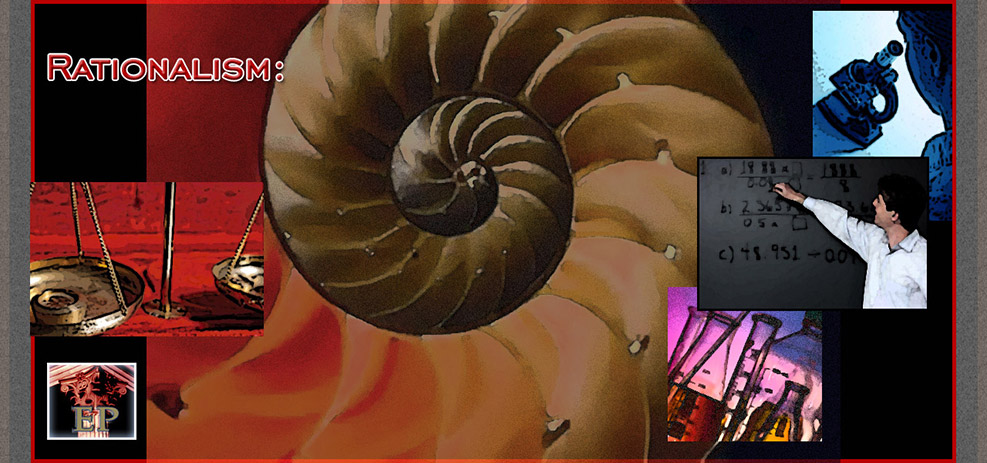
Rationalism
The career of philosophy has been a rocky one, and of rationalism, one particular perspective within philosophy, even rockier in some ways. Philosophy as a whole, to begin with, is an especially difficult discipline. Adding to the difficulty has been conflict with assorted religions, and more recently with oligarchs. But the most important difficulty has centered on determining just what it is that rationality is comprised of.
The main technical issue has been supposed to center on a somewhat abstruse controversy between rationalists and empiricists concerning how knowledge is properly and best acquired. In this controversy, the empiricists are said to claim that all knowledge is based exclusively in information derived from the senses. The rationalists, on the other hand, are supposed to have said that this sort of knowledge is always contingent, and never entirely certain, and thefore also of less value that the sort of more certain knowledge that we find, for example, in mathematics.
However, while this controversy, which arose in the 17th century, was, and to some degree still is, important, rationalism more properly conceived is a much larger and more important subject. Its origins lay, not in a 17th century controversy, but rather in ancient Greek thought and in the founding of philosophy itself. One question the Greeks concerned themselves with was the question of what characteristic most distinctively and best characterizes human beings. And here Aristotle's answer, rationality, has been a pillar of Western thought itself ever since.
However, three critiques of this view converged around the middle of the twentieth century. One school of religious thought developed the idea that religion is properly based in "faith", and that reason is of secondary importance at best. The psychologist Freud argued that rationality is at best a kind of surface veneer, and that human beings are better characterized in terms of more subterranean currents of sexuality. And others, with roots going all the way back to Dionysos, argued, as Dostoevsky and D. H. Lawarence were to emphasize later, that reason only comprises only a fraction of the human capacity for life. In that perspective, rationality was viewed as a kind of obnoxious and objectionable brake on the deepest sources of human joy.
The 17th century controversy was tangential to all of these critiques, and had only some relevance to the main currents of ancient Greek thought. Moreover, modern phenomenological thought has entirely recast the parameters of that controversy, so we don't devote a great deal of attention here to that controversy, or to rationalists such as Rene Descartes, Baruch Spinoza, and Gottfried Wilhelm von Leibniz. Moreover, we consider the later British empiricists, mainly Locke, Berkeley, and Hume, to be veritable warehouses of especially pernicious ideas.
Our view is, instead, that American Brand Blanshard, was the most important philosopher of the 20th century, followed fairly closely by Edmund Husserl. Blanshard's defense of rationalism has amply met all of the chief objections raised against it, and has set the stage for a post-analytical philosophy that can go forward in far more productive ways than is currently the case. This is more important than it might seem at first sight: getting the discipline of philosophy itself back on track is also the foundational task for getting Western civilization itself back on track - and this is precisely Blanshard's accomplishment. This can, perhaps, most readily be seen when we consider the gross, but inevitable, incompetence of Donald Trump, who exemplifies the consequences of an abdication of rationalism.
Among the intellectual descendents of Husserl, we consider the most important figure to be British philosopher Colin Wilson. Wilson's contributions centered on philosophical psychology, an arena in which he achieved breakthroughs that are also of enormous importance for the project of Western civilization. While his thought exhibits some deficiencies, these might have been rectified had he known Blanshard's work. Unfortunately, however, he didn't, so we will be providing tools here to help familiarize readers with the thought of both men, and to understand how their ideas are complementary.
This Is a Temporary Stub . . .
But You Won't Be Waiting Long!

